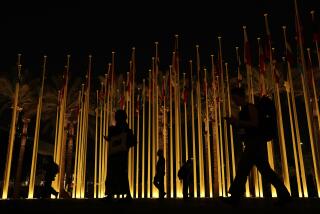OPEC Ministers Work on Pact Privately After Talks Falter
- Share via
VIENNA — OPEC ministers broke up a formal strategy session Monday without results and then bargained privately about terms of a new accord to keep crude prices strong.
The ministers intend to produce a new agreement setting their price and production goals for the last six months of the year. No date was set for resumption of their formal talks.
Rilwanu Lukman, the president of the 13-nation Organization of Petroleum Exporting Countries, warned his colleagues that the oil market could be easily upset.
“We therefore urge caution against complacency, at this stage, for these (price) gains have yet to be consolidated,” he said.
Crude prices are more than 40% above their levels of late last year.
The average price of a basket of crudes monitored by OPEC was nearly $17.70 a barrel last week, not far off the cartel’s $18 target.
Reflecting oil traders’ expectations of a successful meeting, the contract for July delivery of West Texas Intermediate, the benchmark American crude, rose 38 cents to $20.52 a barrel Monday on the New York Mercantile Exchange.
Also pushing up oil prices were speculation about the effects of the death of Ayatollah Ruhollah Khomeini, the upheaval in China and the explosion of a natural gas pipeline in the Soviet Union, traders said.
Agree on Production
Gasoline prices have skyrocketed in recent months, reflecting the surge in oil prices.
Attempts to fashion a compromise before the opening of the mid-year ministerial conference were not successful.
After meeting in a formal session for nearly three hours Monday, the officials decided to talk among themselves to try to settle their disputes.
The ministers appeared to be in general agreement on boosting their output ceiling from the current 18.5 million barrels a day to as much as 20 million barrels.
Lifting the production cap to 20 million barrels, analysts say, would likely have little impact on crude prices or gasoline prices.
OPEC has been pumping about 21 million barrels a day in recent weeks, a pickup analysts attributed to jockeying for position at this meeting.
In their bargaining, the ministers were stuck on how to divide the extra amount of production among themselves. Kuwait and the United Arab Emirates want a much bigger share of the increase.
“We’re bringing a very reasonable and a very just case,” argued the Kuwaiti minister, Sheik Ali al Khalifa al Sabah.
But Saudi Arabian Oil Minister Hisham Nazer said he was against preferential treatment for others.
Iran’s Gholamreza Aghazadeh insisted that any increase should be divvied up proportionately among all members.
Aghazadeh said he would remain at the meeting rather than return to Tehran for Khomeini’s funeral.
He had predicted Sunday that the ministers would speed up their work so he could go home early, but no quick finish appeared in sight.
“We’ve had some progress (in the talks) but we still have to reach a consensus,” said Ecuador’s Diego Tamariz.
Qatar’s Abdul Aziz bin Khalifa al Thani said, “There’s not a deadlock. (The talks) are moving but slowly.”
Demand Scuttles Deal
A compromise that emerged during the weekend would have included raising output to 20 million barrels a day in the July-December period.
Of that sum, 500,000 would be parceled out among five countries--Kuwait, the United Arab Emirates, Gabon, Ecuador and Qatar.
The additional 1 million barrels would be passed out proportionately among all 13 member countries.
Kuwait, however, demanded more, scuttling the deal, according to an official of one delegation, who spoke on condition of anonymity.
Late last year, the cartel agreed to slash its production, a move that helped drive up crude prices this year. Accidents in oil-producing regions, particularly the North Sea, have also curbed supply and kicked up prices.
OPEC members are: Algeria, Ecuador, Gabon, Indonesia, Iran, Iraq, Kuwait, Libya, Nigeria, Qatar, Saudi Arabia, the United Arab Emirates and Venezuela.
More to Read
Sign up for Essential California
The most important California stories and recommendations in your inbox every morning.
You may occasionally receive promotional content from the Los Angeles Times.













